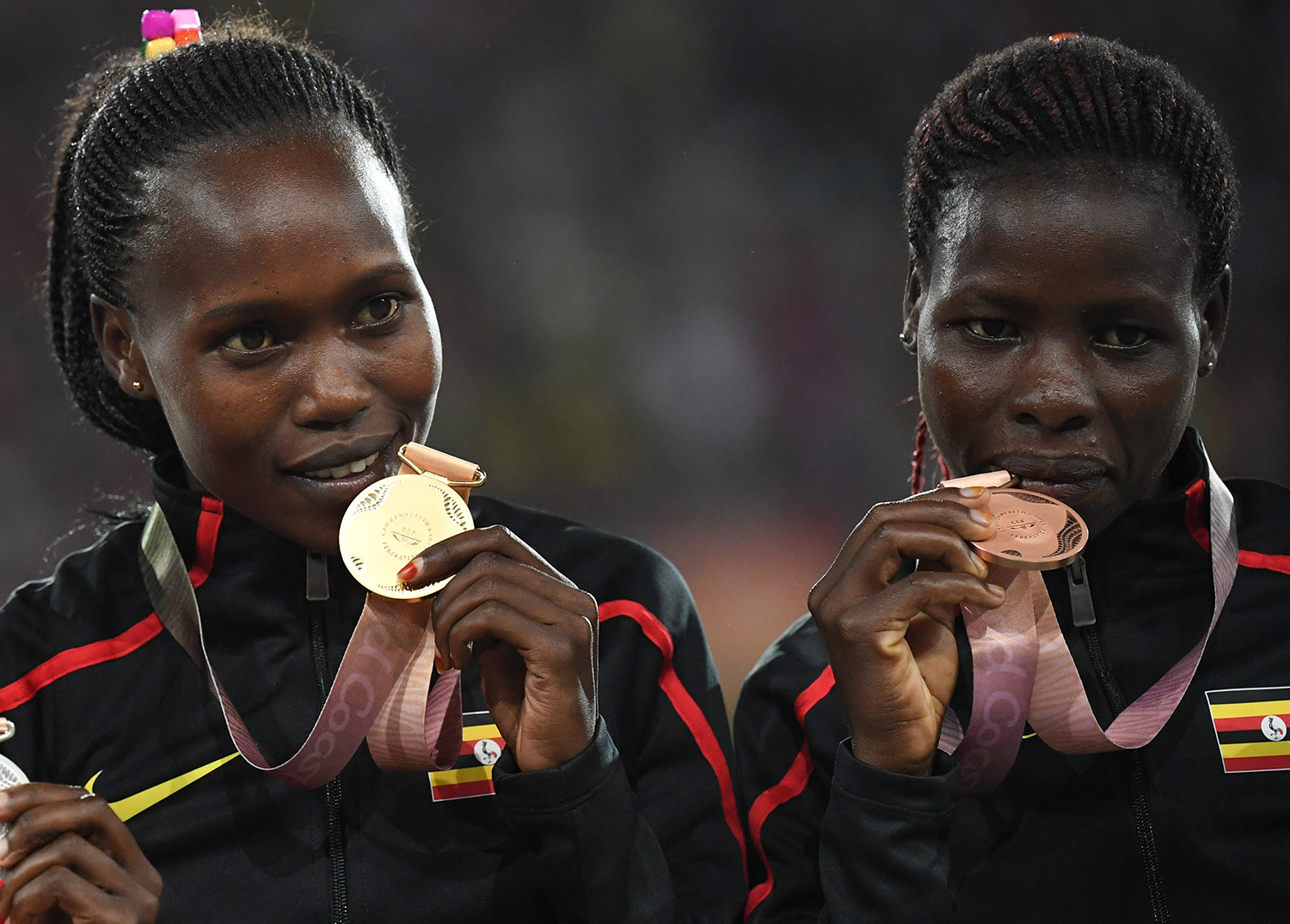Mentorship malaise hurting Uganda's girl athlete
Mar 16, 2023
The making of a champion apart from a commitment to gruelling camp life does not exist

Stella Chesang (left) and Mercyline Chelangat pose with their medals after the athletics women's 10 000m final during the 2018 Gold Coast Commonwealth Games. AFP Photo

Charles Mutebi
Sports journalist @New Vision
Stella Chesang got Commonwealth gold. Mercyline Chelangat got Commonwealth bronze. Uganda got new stars, a dynamic duo with talent and time to uplift the fortunes of its feminine brand of long-distance athletics.
A sustained period of glory was predicted for Chesang and Chelangat post-Gold Coast.
Both chose to take time off from athletics to give birth.
Motherhood and sports success are not incompatible, as athletics superstars Faith Kipyegon and Shelly-Ann Fraser-Pryce have demonstrated. But for high-level athletes, who operate on thin margins, knowing when to be a mother can be the difference between stardom and an unfulfilled career.

Chesang finished fourth at the 2022 Commonwealth Games, and Chelangat was 16th at the 2022 World Athletics Championships in Oregon. Those two years they took out to become mothers just as their careers were taking off have not been redeemed yet. And will they ever?
Mentor me
Chelangat and particularly Chesang have shown admirable effort in trying to revive their careers, with the latter setting national records in the women's 10,000m and half marathon. But how much, further along, would Chesang be without the aforementioned maternity break?
For Uganda's top athletics coaches, this kind of uncertainty is the reason why they often hesitate to project the future of their female talents. For starters, young female athletes are often reluctant or unable to commit to intense training regiments which require athletes to stay in camps for extended periods.
“Many parents feel uncomfortable having their female children with male coaches,” elite national coach Benjamin Njia told New Vision.
“Talented girls end up being asked to stay back home by such parents instead of training and by doing so, the country and those young girls lose out.”

National athletica coach Benjamin Njia. Photo by Richard Sanya
As Kipyegon would testify, the making of a champion apart from a commitment to gruelling camp life does not exist. But a female mentor or coach would be best positioned to win the commitment of a young female athlete fearful about settling in a camp where she may have no confidants.
“The problem we have is that these young girls need female coaches whom they will be free and easily relate with,” adds national coach Njia.
Truth is, that is not a problem because the emotional and psychological elements of a sportswoman are just as important as the physiological ones. The issue is the total absence of female coaches or mentors for female athletes.
Grace Chesang of UPDF Athletics Club, is the only certified female athletics coach in Kapchorwa. With such a discrepancy, it’s easy to see why Uganda’s top female athletes are vulnerable to all sorts of influences.
It’s delicate
Prisca Chesang is the future of Ugandan female athletics, a reminder of which was provided at World Cross Country Championships in Bathurst, Australia, where she outperformed all her teammates.

Prisca Chesang is seen as the next big female star of Uganda's athletics program.
Three weeks ago, she finished second in the 3000m at the Maurie Plant Meet in Melbourne.
Chesang, who has two U-20 World Athletics Championships bronze medals in the 5000m, will be a medal contender at the 2024 Olympics.
But her coaches are honest enough to admit the biggest threat to Chesang’s future may not come from Kenya or Ethiopia but right at home in Kapchorwa.
“It will depend on the decisions she makes in her private life,” said one of her coaches. “Otherwise, she has all the talent to be a world champion one day.”
It was stunning to hear the Minister of State for Sports, Peter Ogwang, turn part of his tour to Kapachorwa three months ago into an address on the love life of Uganda’s female Olympic champion Peruth Chemutai, tasking local authorities to address concerns that her boyfriend was "destroying" her career.

Peruth Chemutai pictured training in Kapchorwa. Photo by Richard Sanya
Though misplaced, Ogwang’s comments underscored the struggle within Ugandan athletics.
The solution, or at least a major part of it, is in the creation of a robust culture of mentorship that sees the development of a female athlete as the result of both physical and psychological well-being.

No Comment